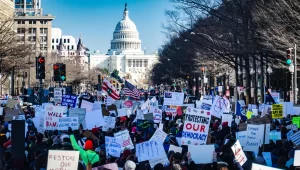I haven’t been writing much lately. Between family health care issues and a full-scale constitutional crisis, aka coup, I’ve been thrown into what feels like a cyclone of political organizing. One could say I’ve been writing like crazy, but it’s all calls to action, newsletter updates, emails, and carefully constructed agendas–left brain stuff that speaks to my skill set, but doesn’t quite feed the hungry monster inside who only likes the juicy, creative stuff.
And yet, the questions came up once again this morning in one of my Zoom writing groups:
- How do we write in these times of upheaval?
- Does anything we write matter?
- Do we have a responsibility to use our writing to speak out?
- What if we don’t want to write about political things–or feel like we can’t write about political things without having our work turn into a rant or some didactic prescriptive cliché?

Ted Eytan/Flicker/Creative Commons, nhpr.org
As someone who embraces the dual identities of writer and activist. These are questions I’ve struggled with all my life.
Back in my 20s, I lived briefly in a social change community in Philadelphia, learning facilitation and organizing skills, studying theories of nonviolence, and engaging in personal growth initiatives, which included being frequently challenged on my choices and attitudes. I remember one person from the community saying something like, There’s no point in writing all these poems about your feelings. You can get counseling on those. Write poems about the state of the world that matter.
I know that all writers store hurtful comments that lodge like ear worms in our brain. This was one of mine. It probably took thirty years before I could hear it in my head without feeling reactive.
No one should dictate what we should write, even when people are being well meaning, such as the numerous times a friend or acquaintance has said to me, you should write a story about ______________.
No, I always say. You should write that story.
Ask me, if you need my help, to write an article, a flyer, or a delicate email. Ask me for feedback or editing on your story. But when it comes to poems, or fiction, or essays, I’ll choose what I want to write about–thank you very much.
This doesn’t mean the questions above are invalid–only that each of us needs to answer them for ourselves. In the last ten years, I’ve been motivated to write more things that might be considered “political,” but this is because I’ve figured out a way to approach them from a personal angle. For instance, my poem, Evening, recently published in Collateral, a journal that defines their mission as “publishing literary and visual art concerned with the impact of violent conflict and military service beyond the combat zone,” layers reflections on the Gaza War as I’m playing with my grandchild in the backyard.
Whether or not our writing becomes an overt call for action during these dark times, it still matters. There are countless articles on the Internet on the role of art not only as a political catalyst, but also as a force that heals–both the person who creates it and those who read, or view, or listen to it. I remember shortly after the 2016 election, when many in my community were caught in a tizzy of fear and disorientation, a close friend who is a visual artist said to me, “The best thing we can be doing right now is our creative work.”
I’m glad this is another ear worm that has also stuck in my brain, inspiring me to keep doing the work.
Subscribe at https://ddinafriedman.substack.com
